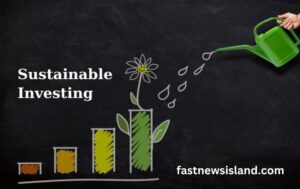Sustainable investing is a rapidly growing trend in finance as people become aware of how their investments can affect the environment and society.
Sustainable investing is investing in companies and projects focused on creating a positive social and environmental impact while still generating returns for investors. It is essential to remember that the goal of sustainable investing is not only to make money but also to impact the world positively.
Let’s understand what is sustainable investing, what are ESG factors, and things to consider before choosing a sustainable investment.
What is Sustainable Investing?
Sustainable investing, often referred to as responsible investing, is a strategy that considers ESG (environmental, social, and governance) criteria in addition to financial considerations, when researching a company. It aims to achieve financial returns while promoting positive social and environmental outcomes. The importance of considering ESG factors in investment decisions has grown in recent years as more and more investors are becoming aware of their investments’ impact on the world around them.
Integrating ESG factors into investment analysis can lead to a more comprehensive understanding of a company’s performance and potential risks. To get started with sustainable investing, one can open a free Demat account and invest in companies that align with their values and beliefs.
Sustainable investing can take various forms, such as investing in companies that support renewable energy sources, investing in companies that commit to employee diversity, or investing in companies that commit to corporate social responsibility.
Sustainable investing can also take the form of investing in environmental funds or green bonds that support environmental initiatives and renewable energy sources.
What are ESG Factors?
Environmental, Social, and Governance, or ESG, are three factors considered when assessing a company’s sustainability and social effect.
- Environmental factors refer to an organisation’s impact on the natural environment, such as its energy efficiency, carbon footprint, and waste management.
- Social factors refer to an organisation’s impact on society, such as its labour practices, racial diversity while hiring, human rights record, and community engagement.
- Governance factors refer to an organisation’s internal management and control systems, such as its transparency, corporate governance, board diversity, executive pay, etc.
ESG variables are considered non-financial data that might offer perceptions of a company’s prospective long-term success and resiliency.
With the help of this investment, businesses will be evaluated on a wider range of factors, including their impact on the environment and society as a whole, rather than just their financial performance. Along with long-term financial gain, the aim is to achieve beneficial societal impact and corporate responsibility.
So, to get started with sustainable investing, understand the Demat account meaning and open a free Demat account.
Considerations for Choosing Sustainable Investments
When considering sustainable investments, investors must keep in mind the following:
- Research and understand the ESG (Environmental, Social, and Governance) criteria of any company or project one is considering investing in. These criteria will help determine how the company or project manages its impact on the environment, society, and governance.
- Consider the potential return on investment and the potential risks associated with sustainable investments. Sustainable investments may have higher or lower returns depending on the selected sector or project.
- Understand the different types of sustainable investments, such as green bonds and environmental funds, and which ones may best fit the financial goals.
- Be aware of the potential impact of the investments. Sustainable investments may potentially affect the environment and society positively, but they can also have a negative impact if they are not managed properly.
By researching and understanding sustainable investments and the companies and projects one is considering investing in, one can ensure that their investments positively impact the world.
In conclusion:
sustainable investing is an approach that considers environmental, social, and governance factors in addition to financial considerations. It aims to achieve financial returns while promoting positive social and environmental outcomes. A free Demat account is a great way to start with sustainable investing.
By understanding Demat account meaning, investors can make informed decisions and align their investments with their values and beliefs.
